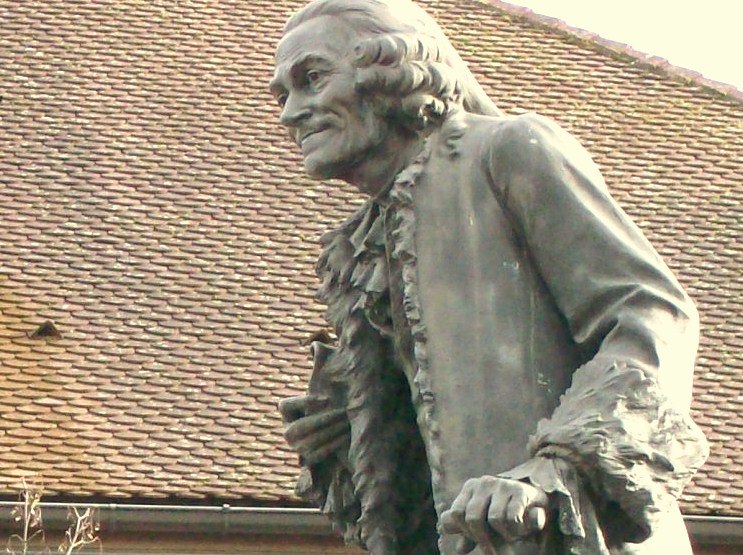William Deresiewicz doesn’t believe in God. He thinks “religion is a lie” — not a weakness, not a mistake, but a lie, which is a pretty bold statement: “The philosophes saw through the falsehood of faith in the seventeen hundreds; I saw through it, one day in yeshiva high school in the midst of my Orthodox Jewish upbringing, at the age of fifteen. I’m frankly surprised that we’re still even talking about it.” (Deresiewicz is responding to a Ross Douthat column from almost a year ago now — “Can the Meritocracy Find God?” — in which Douthat hopes for but at the same time disbelieves in the possibility of a religious revival among the elite.)
Still, Deresiewicz thinks that the decline in religious belief has left “us in a moral and spiritual and in some sense emotional vacuum,” which has been filled by something worse than traditional religion: social justice. Secularism, he writes, “doesn’t tell us what to do or how to live; it doesn’t connect us to anything larger than ourselves; it doesn’t bring us into relationship with other people. It leaves us alone with our terrors, our confusions, our despair. And so we pour our unsatisfied religious longings into an ever-shifting array of crypto-religious enthusiasms: movements, cults, conspiracy theories, New Age quackery, fandom—now, disastrously, politics . . . To be a member of the liberal elite today is to live a life that is as regulated as an Orthodox Jew’s and to possess a conscience that’s as tortured as a Calvinist’s . . . With stunning speed and unanimity, colleges and universities have rebranded themselves en masse as seminaries of social action, places where you go to learn to ‘change the world.’”
Secularism, “at its worst,” Deresiewicz writes, reduced everything to a commercial transaction: “Students went to college now for the exclusive purpose of maximizing their future earnings, and the public supported the enterprise for the exclusive purpose of supplying the needs of the labor market. This was secularism at its worst: materialistic, individualistic, transactional, devoid of moral or spiritual content, hostile to ideas and ideals.”
But is this secularism at its worst — what would that mean exactly? — or secularism as secularism? What is the secular basis for not treating others like a pound of flesh? Deresiewicz is right, of course, that politics has become a religion, and he’s far from the first person to suggest so. But I’m curious as to why he is so convinced that secular humanism is true even though it “has not fulfilled the hopes that people had for it, and neither has secularism in any of its other manifestations.”
This is what he writes at the end of the essay, which has a religious ring to it: “No, secularism cannot reassure us that the universe is governed by a benevolent deity, or that the wicked will be punished and the good rewarded, or that our souls will be clasped after death in the bosom of Abraham. But in leaving us to our devices, it does something better, because it does something truer. It forces us into the search: for truth, for beauty, for justice.”
This seems rather close to claiming that secular humanism is true despite the evidence. It is true despite failing to give a coherent account of what is obviously a universal longing for transcendence, despite failing to provide any sort of definition for the very things Deresiewicz evokes here — truth, beauty, justice — as worthwhile objects of study, despite contributing to the decline of families and communities, and despite making many people much worse off (and, no, we don’t have secular humanism to thank for science).
In other news
Speaking of faith, here’s an article on how your beliefs influence your health, not that you should care about that — “Eat, drink, and be merry,” etc., etc.:
When dozens of apparently healthy young men who had emigrated from Laos started dying in their sleep in the late 1970s, US medical authorities couldn’t fathom what was going on. They termed the phenomenon “sudden unexpected nocturnal death syndrome”, but that was just a label for their bafflement. Today, we think we know the cause: the men experienced sleep paralysis, which is common and harmless in itself; but they understood it as a visitation from the dab tsog, a malevolent spirit who sits on victims’ chests at night. Living far from the shamans and family members who might have helped them ward off the evil, the men panicked, probably exacerbating a form of heart arrhythmia more prevalent in people from south-east Asia, and triggering cardiac arrest. The science writer David Robson’s mission in The Expectation Effect is to convince us we shouldn’t look on those men with condescending pity: our own expectations and beliefs, however irrational, influence our health, happiness and our survival no less decisively.
It doesn’t make any sense, Richard Dawkins writes, to claim to be a woman if you are a biological male, but it might make sense to claim to be black: “Race is very much a spectrum. Most African-Americans are mixed race, so there really is a spectrum. Somebody who looks white may even call themselves black, may have a very slight [African inheritance]. People who have one great-grandparent who is Native American may call themselves Native American. Sex on the other hand is pretty damn binary. So on the face of it, it would seem easier for someone to identify as whatever race they choose.”
Michel Houellebecq’s latest novel, Anéantir, was published on Friday:
Anéantir begins during a fictional presidential election campaign in 2027. Marine Le Pen has stepped down as leader of the National Rally but far-right candidate Éric Zemmour is still sparking controversy. President Emmanuel Macron is another real-life figure who, while not named, seems to feature, as is Bruno Le Maire, the current economy minister. Le Maire, a friend of Houellebecq, is the inspiration for Bruno Juge, one of the story’s protagonists. Juge is critical of the outgoing president (implied to be based on Macron), at one point declaring that the head of state “has one political conviction and one only … ‘I was made to be president.’” After two terms of this leader, Houellebecq presents a country that is on its knees, with high levels of unemployment and poverty.
The New York Times to buy The Athletic for $550 million.
Sesame Street composer Stephen Lawrence has died. He was 82.
Joseph Bottum on Joan Didion’s accomplishment:
Joan Didion mattered. There really isn’t much more to say, although the nation’s magazines and journals were filled with the attempt after her death on December 23 at the age of 87. The New Yorker, the Los Angeles Times, Harper’s Bazaar, The Chronicle of Higher Education: thousands of words of obituary prose, like one last spasm of the sad zombie heart of American literary culture. Certain themes, certain tropes, appeared over and over in the valedictions. Her prose was always said to be precise and biting. Her voice astringent. Her observations bracing. Her legacy secure. California’s governor, Gavin Newsom, declared that Didion’s “ability to put the tapestry of California and the times into words made her a treasure for her generation and generations to come.” “A treasure for her generation and generations to come” — it’s the kind of empty phrase that would have made Joan Didion gag, except that she didn’t exactly gag on the silly platitudes and self-congratulatory feel-goodisms of bad American discourse. She heard them, and they seemed actually to hurt her.
Newly formed Jack Kerouac Foundation plans to build a museum and performance center in Lowell: “‘What we’re trying to do is create a beautiful setting, a beautiful museum space, that is very [welcoming],’ said Jim Sampas, the literary executor of Kerouac’s estate and CEO of the new foundation. ‘We can have various arts, whether it be spoken word, music, lectures on literature, all sorts of different things take place in that setting,’ said Sampas, who is also Kerouac’s nephew.”

























